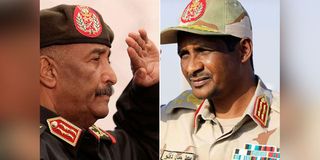Prime
Abdel Fattah al-Burhan and Mohamed Hamdani to meet in person: Igad

Sudan's army chief Abdel Fattah al-Burhan (left) and Rapid Support Forces commander Gen Mohamed Hamdan Daglo 'Hemedti'.
Leaders of Sudan's warring factions are heading for the first face-to-face meeting between them, signalling a first step towards ending the country's brutal conflict.
The Intergovernmental Authority on Development, the regional bloc in the Horn of Africa, said on Sunday that Mohamed Hamdani Daglo 'Hemedti', the leader of the Rapid Support Forces, had agreed to meet his arch-rivals in the Sudan Armed Forces, led by Abdel Fattah al-Burhan.
If the two leaders meet, it would be the first time since the war broke out on 15 April, killing at least 7,500 people and displacing more than 5.4 million. But there was no definite date for the meeting.
Igad leaders said after their summit on Saturday that they had spoken to Hemedti by telephone. They said they "appreciated his acceptance of the Assembly's proposals for an unconditional ceasefire, the resolution of the conflict through political dialogue and the holding of a one-on-one meeting with the Commander of the Sudanese Armed Forces (SAF) with the facilitation of Igad".
Burhan and Hemedti, once allies in the Sudanese transition, later fell out over the way it should proceed. But at the IGAD meeting in Djibouti, leaders said that Sudan's long-term peace depended not only on the two protagonists, but on all other political and armed actors in the country.
Igad said it would "expedite efforts" to organise an Igad-African Union-facilitated "all-inclusive, Sudanese-owned and Sudanese-led civil dialogue aimed at forging a national consensus for the formation of a civilian-led transition that will culminate in the holding of open, transparent and democratic elections".
Igad agreed to establish a framework of respected diplomatic and political interlocutors, nominated by heads of government, to mediate in Sudan. The bloc includes Sudan, Kenya, Ethiopia, Djibouti, Eritrea, South Sudan, Somalia and Uganda.
While the bloc is also expected to appoint a special envoy for Sudan, it was unclear whether the quartet of countries that originally tried to mediate in Sudan would continue. These countries were Kenya, Ethiopia, South Sudan and Djibouti. Sudan had rejected Kenya's leading role, although Burhan and Kenyan President William Ruto have since publicly reconciled their views. The summit said "the Quartet has ably performed the task for which it was established...".
At the Igad summit, leaders condemned unnamed external entities for fuelling the war through "unwarranted interventions and interference" by supplying and resupplying war materiel to both sides of the conflict.
Since the war began, Sudan's various allies have attempted parallel peace offers, most of which have failed due to the parties' refusal to honour ceasefire agreements and humanitarian corridor provisions.
One such attempt was the Jeddah peace process, initially led by the US and Saudi Arabia, but now including the African Union and Igad. In November, the SAF and RSF pledged to open humanitarian corridors and direct channels of communication. This hasn't happened.
Igad says there should be "consolidation and pooling of efforts under the Igad-AU-led process to chart a unified and coordinated path to peace under the Igad roadmap, which it wants the African Union and the UN Security Council to endorse.
"(The Igad summit) called for a unified African anchored mediation process that coordinates the various national, regional, continental and international efforts and tracks under the auspices of IGAD and the AU."
Meanwhile, the SAF admitted on Sunday to firing on Red Cross workers, killing at least two and wounding seven others.
The Sudanese army said in a statement that it fired on the Red Cross mission because the aid workers had violated an agreed path during an evacuation of foreigners from St Mary's Church in Al-Shajara neighbourhood, south of Khartoum.
The army said the aid workers had entered the area from the south instead of the north.
The International Committee of the Red Cross said it was appalled by today's deliberate attack on a humanitarian convoy in Khartoum.
"The humanitarian convoy, consisting of three ICRC vehicles and three buses, all clearly marked with the Red Cross emblem, was evacuating over one hundred vulnerable civilians from Khartoum to Wad Madani when it came under attack as it entered the evacuation area," the Committee said.
"The humanitarian operation had been requested and coordinated with the parties to the conflict, who gave their consent and provided the necessary security guarantees.
"This attack is unacceptable and we are deeply saddened," said Pierre Dorbes, head of the ICRC delegation in Sudan.
"I am shocked by the total disregard for the Red Cross emblem, which must be respected and protected under international humanitarian law. Our mission today was to bring these civilians to safety. Instead, lives have been tragically lost. My heart goes out to the relatives of those killed and we desperately hope that those injured will make a full recovery".
Due to the lack of a ceasefire and proper humanitarian corridors, at least 22 aid workers have been killed in Sudan since the war, according to a tally by charity CARE International, making it one of the deadliest places for humanitarian workers in Africa.
Additional reporting by Mawahib Abdallatif





